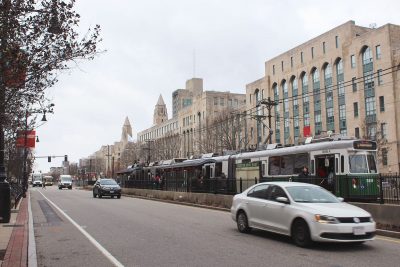Boston University was ranked No. 28 in the country and No. 1 in Massachusetts for ‘Most Desired Colleges of the Last Decade’ in a report released Tuesday by LendEDU, an online marketplace that focuses on providing student loan information.
The list ranks 1,253 four-year institutions’ desirability to prospective students over the last decade. LendEDU does so by averaging each school’s percent increase in applicants between 2008-09 and 2018-19 with its raw increase in admissions yield over the same period.
BU saw a 90.04 percent inc

rease in the number of applicants and a 4.42 percent increase in its admissions yield between 2008-09 and 2018-19, according to the report.
Mike Brown, a research analyst at LendEDU and writer of this report, said LendEDU does frequent research involving student loan debt and higher education affordability. The new decade inspired Brown to compile this list.
“This is the first time we’ve done this study and really, it’s because it’s the new decade,” Brown said. “We’ve been trying to revisit trends from the last decade.”
Brown said the study did not involve extensive analysis of why certain colleges may have risen or fallen in desirability, but that he thinks BU’s ranking indicates that it has become a highly sought-after institution.
“But for BU, if you look at this data, what it tells you is that people want to go to BU when they apply there, and if they get in, they’re likely to be going there,” Brown said. “That speaks volumes about BU in general.”
Colin Riley, a BU spokesperson, said BU’s placement on the report as No. 1 in the state is especially notable considering the number of colleges and universities in Massachusetts.
“It’s certainly intriguing to see, if you look state by state, the individual schools that are ranked at number one,” Riley said. “To be that, here in Massachusetts where there are so many outstanding higher education institutions, it speaks well of BU.”
One of the first figures prospective students see when they visit BU’s admissions website is that BU now meets 100 percent of the financial needs for first-year students who are U.S. citizens or permanent residents. Brown said his research with student loan debt led him to believe that prospective students value affordability above all else when looking at higher education institutions.
“In terms of what college students are looking for, the easiest answer to that would be affordability,” Brown said. “[They look for] what schools are the most affordable and will limit the amount of student loan debt [they] need to take on to attend that school and still receive a quality education.”
In addition to financial aid information, the BU admissions page advertises that the university is ranked No. 10 by Open Door in campuses with most international students, No. 18 by Times Higher Education for employability and sees 96 percent of graduates employed or placed in graduate programs, fellowships or military service within six months of graduation.
Although Brown sees affordability as a key consideration of students applying to universities, several current students at BU said they believe prospective students are attracted to BU for its wide range of academic opportunities and programs, as well as its international student body.
Meredith Saunders, a sophomore in the Questrom School of Business, said she believes the versatility and adaptability of BU’s academic structure attracts prospective students as it stood out to her when she was applying to schools.
“BU has a lot of awesome programs. It’s just got a lot of differentiation and a variety of different programs to go into, and I think that makes it very valuable,” Saunders said. “The fact that there are so many different things you can choose from and if you change your mind, it’s easy for you to hop to another school, that just seemed very valuable to me.”
Sachpreet Nehal, a sophomore in the College of Arts and Sciences, said he was considering both BU and Northeastern University when applying to colleges, but ultimately decided on BU because it afforded him more academic flexibility.
“I was undecided, which is why I didn’t want to go to Northeastern because they have the Co-Op program and it’s very specific, so you have to know what you want to do,” Mehal said. “I felt like I would have a better time here and a wider range of opportunities.”
Morgan O’Keefe, a sophomore in the Sargent College of Health and Rehabilitation Sciences, said she thinks students have come to value higher education environments that feature less competition and more opportunity over the last decade.
“At most elite schools, I feel like people are often trying to be number one, even if that requires pushing people down to get there. But BU is a really mutually collaborative environment, and we boost each other up,” O’Keefe said. “We know that we have a lot of opportunities, but I don’t feel like I’m always competing with kids for those same opportunities.”












































































































